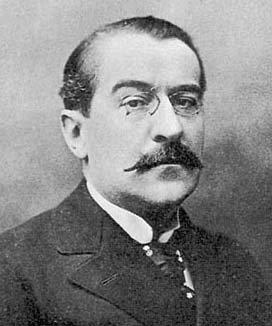<Back to Index>
- Mathematician Charles Émile Picard, 1856
- Architect Alexander Jackson Davis, 1803
- 2nd President of Paraguay Francisco Solano López Carillo, 1826
PAGE SPONSOR

Charles Émile Picard (24 July 1856 - 12 December 1941) was a French mathematician. He was elected the fifteenth member to occupy seat 1 of the Académie Française in 1924.
Picard's mathematical papers, textbooks, and many popular writings exhibit an extraordinary range of interests, as well as an impressive mastery of the mathematics of his time. Modern students of complex variables are probably familiar with two of his named theorems. His lesser theorem states that every nonconstant entire function takes every value in the complex plane, with perhaps one exception. His greater theorem states that an analytic function with an essential singularity takes every value infinitely often, with perhaps one exception, in any neighborhood of the singularity. He also made important contributions in the theory of differential equations, including work on Painlevé transcendents and his introduction of a kind of symmetry group for a linear differential equation, the Picard group. In connection with his work on function theory, he was one of the first mathematicians to use the emerging ideas of algebraic topology. In addition to his path-breaking theoretical work, Picard also made important contributions to applied mathematics, including the theories of telegraphy and elasticity. His collected papers run to four volumes.
Like his contemporary, Henri Poincaré, Picard was much concerned with the training of mathematics, physics, and engineering students. He wrote a classic textbook on analysis, one of the first textbooks on the theory of relativity. Picard's popular writings include biographies of many leading French mathematicians, including his father in law, Charles Hermite.